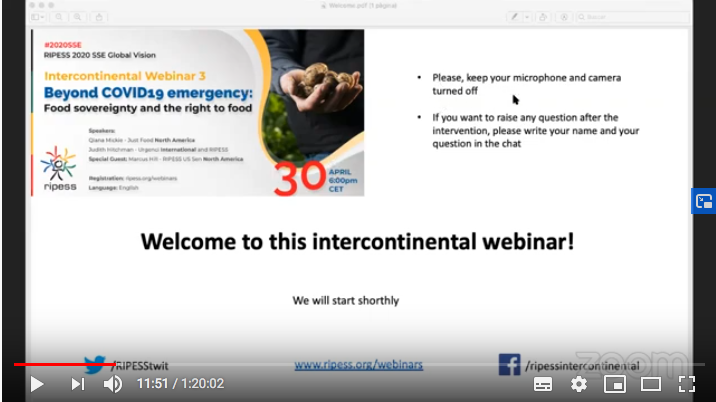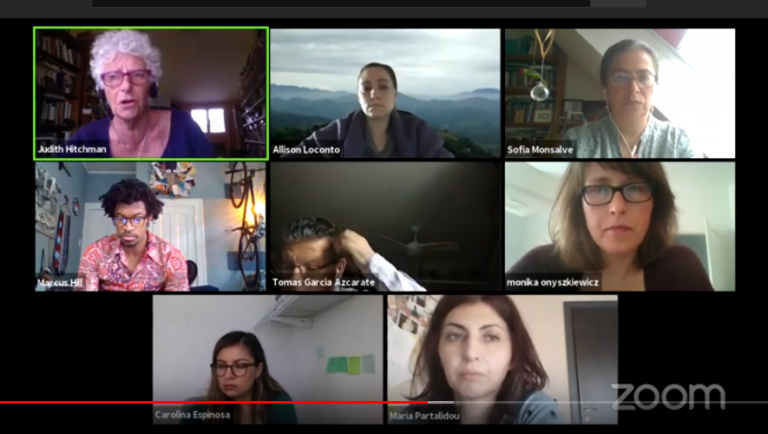By Judith Hitchman, President of the International Committee of URGENCI
The 3rd in the special series of RIPESS webinars covered the field of COVID-19, food sovereignty, solidarity economy and the right to food. The participants were Qiana Mickie, special policy consultant with Just Food in New York, Judith Hitchman, president of Urgenci International Community Supported Agriculture Network, and Marcus Hill, from the US Solidarity Economy Network as special guest. Sofia Monsalve, Secretary General of FIAN International was the very able moderator.
The webinar was recorded. You can watch it online:
https://www.youtube.com/watch?v=1lGhP7u0oQc&feature=emb_logo
Qiana Mickie began by setting the stage and explaining how corporate agriculture and industrial capitalism is fast crumbling on the existing fault lines of race, class, and exploitation putting profit before people and land. COVID- 19 has exacerbated this fall. The message from the industrial food system from Smithfield’s, the US biggest pork manufacturer is that the food supply is in danger. This is meant to elicit fear in people. There is a bottleneck in this faulty system that is based on big business, large scale and commodity farmers. However this is in no way indicative of the local solidarity-based food supply chain.
One of the key challenges at present is a fast re-knitting of industrial capitalism in the light of COVID-19 which we know from past experiences means the system will become even more exploitative, extractive, and harmful than before. We are also seeing how corporate agriculture is deepening its connection to the emergency response models that is based on charitable work and soup kitchens that persistently keep people in need rather than building not self-determination and food sovereignty. These are just stop-gap measures to offset the bottleneck of commodities crops and livestock and a co-optation of language, of addressing food security and actual need. There will now be even more people channelled into this cycle of reliance of excess food that also has a negative knock-on effect in terms of low prices paid to producers. Emergency food models like food pantries and food banks see increases in donations- monetary and food- in crises. It remains charitable and does not shift people out of the neoliberal system of dependancy.
So what are the solutions? In the midst of this crisis and need, we need to amplify our actions and not lose our solidarity principles and work in food sovereignty. This is how one can push back on the re knitting of a inequitable system, by building one based on co-operation, social justice, and food sovereignty. There are solutions in solidarity-based, self-determined alternative food economies like Community Supported Agriculture, Community-run Farmers Markets that support local farmers at a fair price for healthy food that is grown using agroecological principles that ensure no use of chemical inputs and fair income for both producers and farm workers as well as ensuring direct distribution to the community.
The struggle facing people in NYC is that the local food supply chain is under-resourced and risks being further marginalized. While some internal CSAs are seeing increased memberships, in the USA and especially in NYC there are lower membership commitments. We know that local supply chains are more direct, that there is greater transparency in harvesting and agricultural practices, and fewer intermediaries in the system.
Just Food is working on policies that will support local producer to consumer models and diversified farmers in our region, identifying resources for local farmers and community groups to ensure local supply is available. This includes identifying SSE partners to work on last mile delivery and getting home deliveries of shares to homebound folks.

In order to better intensify urban agricultural production in NYC, there needs to be an improved and comprehensive urban agricultural policy that encourages and supports enterprise on common municipally-owned land and that acknowledges the inequity within the spectrum of urban agriculture between community-based agriculture and agricultural technologies. Urban agriculture in our communities was long neglected and carried out essentially by communities of color and mixed income. Most community gardens fall under NYC Parks provisions. They need feasible protocols that they can follow consistently to scale up into production as well as the business acumen. Additional resources are needed as community based urban agriculture does not have the same funding as industrial agriculture. Scaling up urban agriculture to meet a need generated by COVID- 19 will take time to build. There also needs to be an intersection between urban agriculture, rural, and peri-urban agriculture. Urban agriculture can help to meet a diverse need in the city- but not will not and can not replace the work and known scale of rural agriculture. It can however look to SSE models that are proven and mission-aligned to help ramp up faster and build better systems. There is also a need for infrastructure within the city, such as community-based food hubs, storage and aggregation. Effective policy for urban agriculture at local, state, and federal levels is still needed.
Judith Hitchman began by a brief overview of the FAO State of Food Security and Nutrition in the World from 2019 (http://www.fao.org/publications/sofi/en/) that emphasized the renewed increase in undernourishment and food insecurity in the world – including in developed countries – , as well as a significant growth in obesity leading to increased numbers of people suffering from non-communicable diseases such as cancer, diabetes and heart disease. “In order to achieve food sovereignty and the right to food, we need to build on the 10 principles of agroecology as recognised by FAO”. Urgenci has issued a statement on the Covid situation, which also states how it can be part of a wider system change and move forward beyond this crisis. Because the health crisis is creating an economic crisis that will also lead to hugely increased food insecurity. The principles of Solidarity Economy can help to solve this in an intersectional manner. There is a need to support legislation for and implementation of territorial sustainable food systems based on the policy of Connecting Smallholders to Markets and Farm to Fork strategy. Local Government as the level closest to people also needs to support approaches that enable access for vulnerable populations to high quality nutritious food.
With the advent of Covid-19, many existing forms of food distribution and industrial chains have become disrupted. Almost all countries however have agreed that Community Supported Agriculture distribution is safe and can continue, as there is minimal contact with people between the field and the pick up by members. In China, at the peak of the Covid outbreak in January, demand for Community Supported Agriculture and vegetable boxes that were home delivered rose by approximately 300%. There is a similar but slightly lesser demand in Europe. The difficulty this poses is that producers in CSA grow according to subscriptions that are signed up for and paid in advance, and production cannot be suddenly ramped up overnight. What has and is happening however is the creation of many new platforms connecting producers and local consumers. They are taking many different forms, from home delivery to Drives. Some are authentic in terms of SSE principles, others are pure capture by the industrial agriculture system and use neo-liberal principles. It is thus possible to find some vegetable boxes that cost over double what a CSA share might cost!
Urgenci’s role today more than ever is to advocate at policy-making level for short and direct food chains such as CSA, farmers markets and cooperative farmer and consumer shops as well as collective purchasing groups and participatory public procurement policies that ensure the right to healthy nutritious food for all based on the principles of Social Solidarity Economy, equity and food justice. In other words on agroecology and food sovereignty.
Marcus Hill began by providing some quick background: Winston-Salem, where he is based is the 5th largest city in North Carolina with a population of about ¼ million. It’s been noted in the past that this is one of the most food-insecure regions in the country and one of the worst regions for economic mobility. It’s still very segregated in terms of class and race. It is plagued by gentrification, and has a long history of racist housing policies, inequitable investment and, for many, poor access to sufficient resources. As such, there are very few safety nets and insufficient political inclusion for a large portion of our population, and much of what Covid -19 has been exposing in terms of fragile and inadequate social and economic systems has been here all along for the disenfranchised neighbourhoods. But while the fragility of this capitalist food system and the mainstreaming of everyone’s anxieties about it is now a reality, these conditions aren’t all that dissimilar to what many neighbourhoods have already been enduring. So the response has been to continue to push the collectively developed long-term vision for inclusive community development and keep building.
The particular project related to food sovereignty is dedicated to seeing if we can create viable livelihoods out of urban agriculture in a very strategic and specific way. We’re creating a neighbourhood-based non-profit (with board representation across many of the disenfranchised neighbourhoods in the city), to collectively learn and strategize and thus serve as the organizing hub. This means working with graduates of the area’s Urban Farm School to start an Urban Farmers Cooperative for collective purchasing, resource sharing, better market access, and a base for collective land ownership by way of a Community Land Trust. The group has also purchased a bus and are looking to start a mobile “food hub” both for moving urban farmers with limited transportation and for the aggregating and distributing both urban and rural product in the area. There’s potential for new CSA development out of these urban farms via this new distribution infrastructure. All of this responds to the increased demand for local food.
There is also a cultural and political component to this as well to support the broader organizing beyond solely food economics, plus an ecological component working to get our nearby city parks to convert to organic landscape maintenance.
Some of the new frameworks give some insight to how the overall project is being built. First, the structure is informed partially by the work of the Democracy Collaborative. Their work is with models of decolonized community wealth-building and anchor collaboratives, that is, ways to create a collaborative ecosystem of anchor institutions that can support a community project such as this in mutually-beneficial ways. This is a little different than traditional philanthropic/service-recipient/and often charity models. Project elements are then informed by a solidarity economy framework (coops, CSAs, land trusts, etc). Finally, the participatory political dimension here have several different roots, with special emphasis here on Food Policy Councils. Much of this work grew directly out of FPC efforts as they’re great microcosms of participatory democracy.
The presentations were followed by an energetic and rich exchange with some of the many participants in the webinar. What is clear is that with Covid-19 we are facing more acute challenges to the existing neo-liberal food systems. Whether SSE will succeed in rising to these challenges to build global recognition for food sovereignty and the right to food will also be linked to the profound need for change in the fields of access to land, seeds and water, which are the building blocks of the realisation of food sovereignty and the right to food and nutrition.

